
• Part 1: The effect of cancellations of exhibitions and fairs
by ANNA McNAY
The sculpture and installation artist Perdita Sinclair (b1978, Surrey, UK) was self-isolating when I spoke to her, sick with what was hopefully just “normal” flu. She was meant to be going on a three-week oceanography research trip in the mid-Atlantic in May; Armando Ara (b1972, Macedonia, then Yugoslavia, now living in the UK), an artist, art theoretician and co-founder of neomodernism (an art movement that espouses spiritual and aesthetic values in art), was also sick and unable even to talk (a week later, he is on day 14 of the virus, and was told by paramedics the other day that they could not take him to hospital as there were no ventilators available and he was not in a high-risk category).
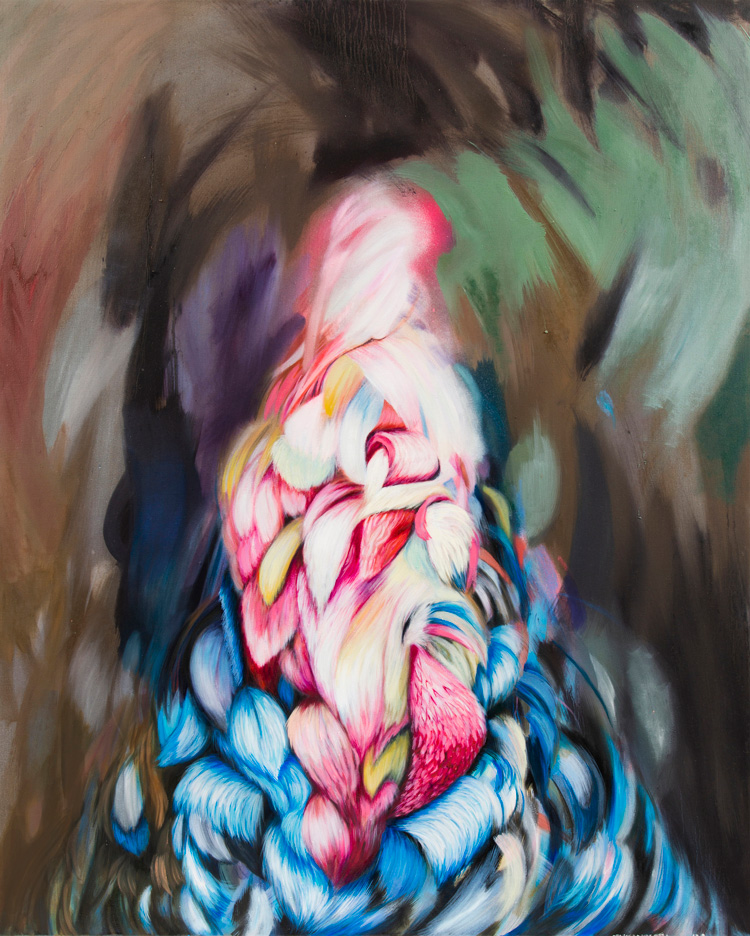
Perdita Sinclair, Black Hole Sundae, 2020. Oil on canvas, 100 x 80 cm. © the artist.
Across the ocean in Canada, Julie Fiala (b1979, Ottawa, Canada) has also been isolating with symptoms. “But they refuse to test because we do not have enough tests,” she says. As an artist whose work relies on international travel, she describes this as a “serious hurdle. The issue is that practices like performance art and all live arts depend on networks of individuals across borders.”
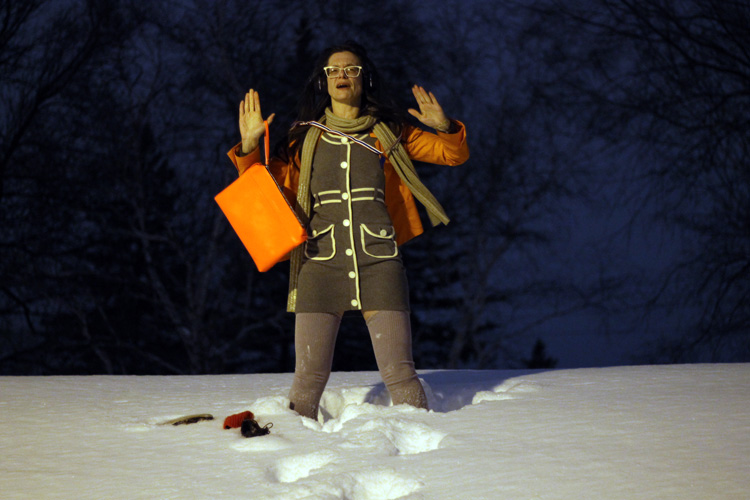
Julie Fiala, The Cold Kills, 2019. Sung performance, one hour, Québec City, Canada. Photo: Yannick L Côté. © the artist.
Fabienne Jenny Jacquet (b1970s, Ajaccio, Corsica, living in the UK), likewise self-isolating after developing flu-like symptoms, is also worried about the impact of travel restrictions, not just of people, but of works. “I think this will have a big impact on art sales. A lot of my work ships into the US and I am not sure what travel restrictions and strain on the transport of goods will have in term of impact. Buyers in general might not want to buy art as much if there is an economic crisis looming, as this is not an ‘essential’ purchase,” she adds.
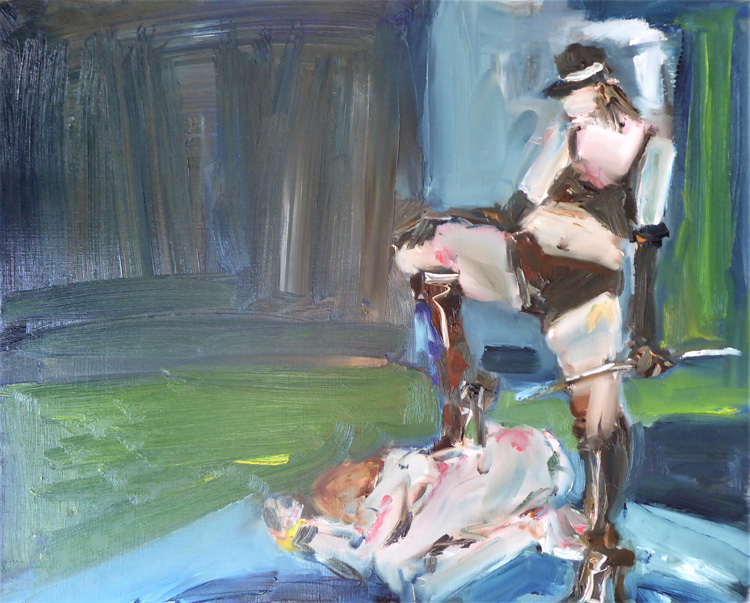
Fabienne Jenny Jacquet, La Douleur Exquise, 2020. Oil on paper, 40 x 50 cm. © the artist.
Another artist who has been sick, most likely with the Coronavirus, is Aleksandra Karpowicz (b1984, Warsaw), who has been working on getting a three-year visa for the US for the past year and was finally due to travel out from the UK next month. Obviously, she is now grounded, with a group exhibition, Forging the Self, at the Koppel Project, London, now unable to take place.
The question worrying many artists is not just the loss of income from sales and other secondary work such as teaching, but the fact that they have to pay rent not only on their homes, but also on their studios. In an open letter response to an email sent on behalf of Space studios, London, advising tenants that they still have to pay their rent, the artists wrote: “The Covid-19 pandemic is exacerbating precarity and inequality in the creative industries, exposing unsustainable practices that have been strategically ignored by employers for too long.”
As the London-based photographer Nicolas Laborie (b1970, Paris) says: “As a freelancer, no jobs means no income. My sole revenue is the sale of my latest book – online – but with only eight copies left, it’s nothing. I have a few prints to sell, too, but not that many people are spending money on art, it seems.”
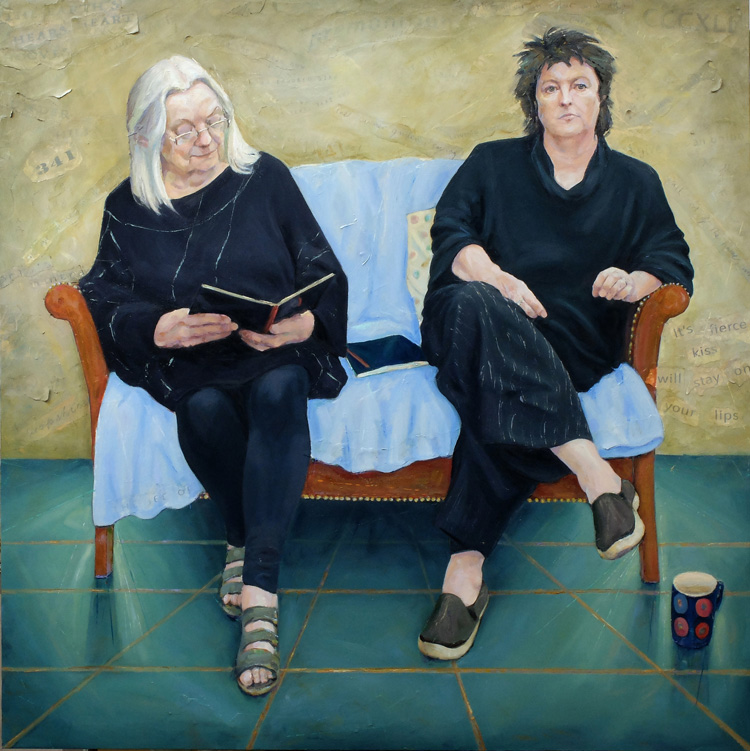
Clae Eastgate, The Poets – a portrait of Gillian Clarke and Carol Ann Duffy, 2017. Oil on canvas, 48 x 48 in. © the artist.
Clae Eastgate (b1960s, Nottinghamshire, UK) voices the worries of many artists when she says: “What a desperate situation. As if artists weren’t already in one of the lowest paid sectors. Unprecedented. What will we artists do when exhibitions are cancelled, workshops and classes are cancelled, commissions put on hold, and so on? It’s all quite depressing and I know for some it is the difference between losing everything with dire consequences. In my own experience, yes, I’ve lost my workshops for the foreseeable future, my bread and butter. I could finish commissions I currently have booked and utilise this time to work on a longer-term project of paintings and do the things I’ve been meaning to do that I have felt too time poor to get done. Perhaps I’ll get my thinking hat on and try and teach via Skype, who knows, reinvent my practice, which could, long term, be the silver lining? How can we be creative in new ways? I know I will be OK, I’ll manage, but there are other artists close to me who won’t at this time. So, it is a time of helping others as well as reinventing our practice.”
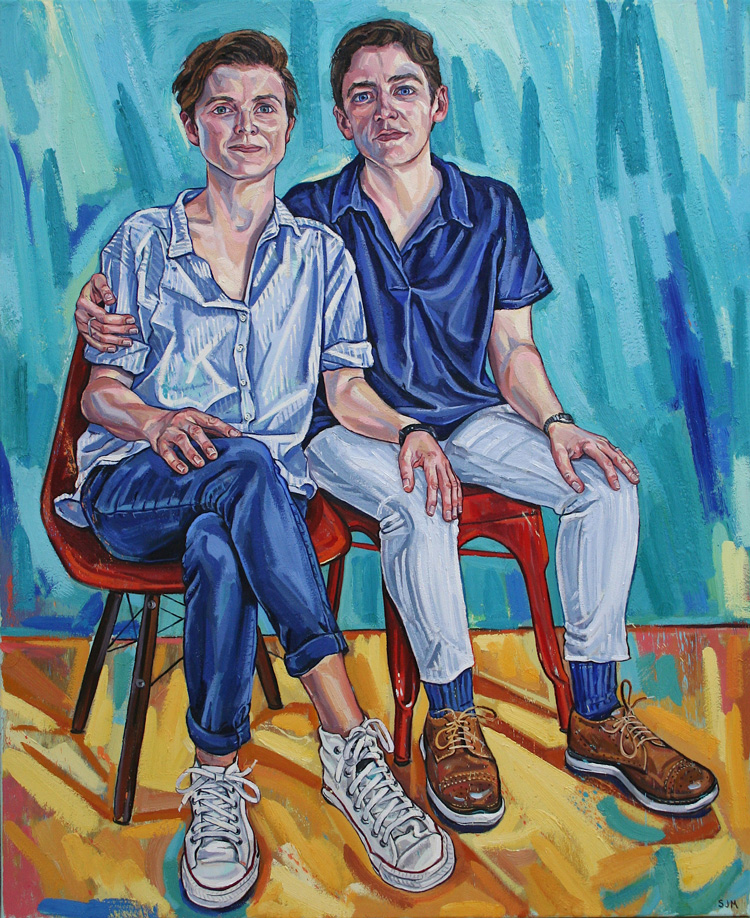
Sarah Jane Moon, Nicole & Kai, 2020. Oil on canvas, 112 x 91 cm. © the artist.
Likewise, the UK-based artist Sarah Jane Moon (b1982, Lower Hutt, New Zealand) has had her teaching cancelled, but her students are working from home or their studios, so she has been inviting them to continue sharing their work with her and is offering support online. “It’s definitely a blow on almost every front for those in creative industries and who are self-employed,” she says. “On the upside I can still paint in isolation!”
,-2020.jpg)
Karen Rémy, Video still from Danse avec Grand-Mer(e), 2020. © the artist.
Karen Rémy (b1984, near Paris), a performing artist, researcher and teacher, based in Marburg, Germany, is another victim of a practice that relies on face-to-face interaction. All her classes and performances have been cancelled, so she is trying to think about how she can move some of this online. She is trained in therapy and shiatsu, so it is important to her to be in the space with her student or participant so as to be able to sense how they are responding. This makes her feels uncomfortable about just putting something out there, unaware of who is responding, but, given the unprecedented circumstances, she says she is “trying to reprogramme [her] thinking on this”.
Miriam de Búrca (b1972, Munich), now based in Ireland, is also trying to organise long-distance tutorials with her students. “It’s a private college, the Burren College of Art, where I lecture in drawing and painting. They mostly get students from the US, the majority of whom have returned home over the last week and a half. I don’t know how long the college can survive if this continues, or if it will be able to revive itself afterwards.”
Moving classes online seems to be standard around the world. Carmen Neely (b1987, Charlotte, North Carolina), in Oklahoma, is also teaching remotely for the remainder of the semester, as is Alex McIntyre (b1982, London) at the University of Bedfordshire, in the UK.
Arts Council England has, in the meantime, made available £160m of emergency funds “for those organisations and individuals who will need it during this crisis”. They have also refocused some grant programmes to help compensate individual artists and freelancers for lost earnings. The rules and criteria are, however, strict, and it seems many artists will not be eligible. In Germany, there is also aid, but it depends on which state you come from as to what and how much. With regard to Ireland, De Búrca says: “The arts are vibrant and a huge source of revenue here, but there is no support mechanism in place for artists’ day-to-day existence. I dare say it’s the same complaint in many countries!”
Indeed, that seems, sadly, to be the case. Many artists fall through the gaps when it comes to whatever aid packages are being proposed, and those who don’t still have to wait months to receive a payout. Governments need to look realistically at what people’s needs and circumstances are – and those will all be different.